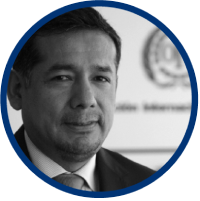
Prior to COVID-19’s emergency, the economic performance of Latin American and Caribbean countries showed visible signs of slowdown as a result of stagnant productivity levels, deteriorating competitiveness and an unstable international context.
With the emergence of the pandemic, challenges have multiplied and the region is facing the worst crisis in its contemporary history. This is demonstrated by the figures of international organizations, which also project a recovery below the global average for 2021 and warn of the threats of a new lost decade for Latin America and the Caribbean.
In their efforts to contain the immediate effects of recession, countries have combined economic and health actions using their limited available resources. However, in order to avoid the realization of its long-term consequences, it will be necessary to undertake immediately an agenda of structural reforms that are the result of new economic and social pacts.
As part of these transformations, promoting the recovery of micro, small and medium-sized enterprises (MSMEs) represents a major task in rebuilding the business fabric and driving inclusive growth.
These productive units are a central component in the economic and social fabric of the region. They make up the vast majority of companies, are providers of a significant portion of goods and services, generate the highest proportion of employment, and are the main source of household income.
In addition, MSMEs expand the range of options for the workforce with low levels of training and fewer opportunities, becoming a mechanism to accelerate intergenerational mobility, reduce poverty, and strengthen social cohesion.
In view of their relevance, smaller companies have been a clear priority in the strategy-making process to boost the region’s economic performance. However, the results have not been as expected and gaps with large companies have widened as a sign that barriers limiting their birth and development remain.
In this regard, emphasis should be made on three of the main challenges facing the region. The first is the growing informality that most vehemently affects the most vulnerable. Its persistence has strong social implications by restricting access to social protection systems and significant economic effects by reducing tax collection and the efficiency of productive factors.
The second refers to difficulties in accessing formal sources of funding. This prevents the development of ventures with wide potential for success, hinders innovation and export decisions, and reduces opportunities for business survival during periods of crisis such as the current one.
Finally, it is necessary to support the digital transformation of MSMEs as a catalyst for productivity and their insertion into value chains. The adoption of digital technologies can be especially useful in modernizing processes, expanding trade links and increasing production scales.
Working on overcoming these constraints is a step in the right direction and would result in large economic and social benefits for the region. However, this will require greater collaborative work and the formulation of new arguments and recommendations that guide actions.
In this regard, and in the context of these three challenges, the Permanent Secretariat of SELA undertakes the organization of this meeting with the central objective of building a roadmap to guide efforts to support MSMEs in the short and medium term, strengthening synergy and coordination among actors living in the region.
| 22 July 2021
Morning |
|
| 10:00 – 10:15 | OPENING SESSION
|
| 10:15 – 11:00 | SESSION I. Boosting productivity and social inclusion: Strategies to reduce informality
Speaker (20 minutes): Panel of analysts (8 minutes each):
|
| 11:00 – 11:45 | SESSION II. Recovery Resources: How to improve access to finance for MSMEs
Speaker (20 minutes): Panel of analysts (8 minutes each):
|
| 11:45 – 12: 30 | SESSION III. Accelerating growth: How to support the digital transformation of MSMEs
Speaker (20 minutes):
Panel of analysts (8 minutes each):
|
(*) To be confirmed

Efraín Quicaña
Since 2018, Mr. Efraín Quicaña, from Peru, has held the position of Regional Specialist in Rural Economy at the ILO Regional Office for Latin America and the Caribbean (LAC). Its main lines of work include innovation for the promotion of decent work; transition to formality; productive development policies for more and better jobs; sectoral strategies for the inclusive and sustainable productive reactivation after the COVID-19 pandemic.
From 2011 to 2017, he worked at the ILO Office for the Andean Countries, where he held the position of specialist in Business, Rural Development and Cooperatives and was Coordinator of several Interagency Programmes of the United Nations System and Projects to promote decent work in the rural economy, productive development and business development. Before joining the ILO, between 1998 and 2010, he held positions of responsibility in various international cooperation agencies (UNDP, FAO, SNV), public institutions in Peru and in the private sector.
He holds a bachelor’s degree in Administration (Peru), a master’s degree in “Regional and Local Development Management” (Chile) and postgraduate degrees at the international level (in Chile, Italy and Spain) in productive development, business development, rural development, market systems and value chains, sustainable companies, comprehensive management of territorial economic development and management of regional and local public policies.

Thorsten Beck
Thorsten Beck is currently professor of banking and finance at The Business School (formerly Cass) in London. He is also Director of the Florence School of Banking and Finance and will take up a Chair of Financial Stability at the European University Institute in September 2021. He is a research fellow of the Centre for Economic Policy Research (CEPR) and the CESifo. He was professor of economics from 2008 to 2014 and the founding chair of the European Banking Centre from 2008 to 2013 at Tilburg University. Previously he worked in the research department of the World Bank from 1997 to 2008 and, over the past 12 years, has worked as consultant for – among others – the European Central Bank, the Bank of England, the BIS, the IMF, the Inter-American Development Bank, the Asian Development Bank, the European Commission, and the German Development Corporation.

Sandrine Kergroach
Dr. Sandrine Kergroach is the Head of SME and Entrepreneurship Performance, Policies and Mainstreaming unit at the OECD Centre for Entrepreneurship, SMEs, Regions and Cities. She leads research work and partnership development for better understanding the business and policy conditions that can help SMEs, start-ups and entrepreneurs reach their full potential, including through innovation, internationalisation, or improved environmental, social and governance performance. She supervises activities related to SME&E policy monitoring and mainstreaming, the development of knowledge infrastructure and the production of the flagship “OECD SME and Entrepreneurship Outlook”.

Marco Bianchini
Marco Bianchini is an Economist of the OECD Centre for Entrepreneurship, SMEs, Regions and Cities. He specializes on SME digitalisation and on the analysis of government policies to facilitate it. He is the Coordinator of the OECD “Digital for SMEs” Global Initiative, an initiative that intends to promote knowledge sharing and learnings on how different types of SMEs can seize the benefits of digitalisation, and on the role of government, regulators, business sectors and other institutions in supporting SME digitalisation.
Mr. Bianchini holds a bachelor’s degree in Economics from the University of Florence and a MSc in Economics from Bocconi University (Italy), both obtained “summa cum laude”. Before joining the OECD, Mr Bianchini worked in McKinsey’s Milan office.
